#Samarra = a reference to the appointment in Samarra tale
Explore tagged Tumblr posts
Text
🌒🌒 | @holyfurnace | Taylor and Astaroth
The problem with making plans with Mephistopheles was always the same, and came from being at the whims of man and Hell. On more than a few occasions, their drinks got interrupted halfway through by a summons-- either from down below or, quite literally, having magic drag them away. Without fail, they would stand, knock back the remains of their drink, and try again... whenever it was an option.
This had been just one more case of that: an ornate letter appeared in front of her rather than a cheque; a problem with the Ars Goetia, they were all so old fashioned, he could have just sent her a text. The letter is clear enough, he wants her to do the dirty work that comes from being on earth, old deal, et cetera, et cetera.
She sighs, and nods apologetically at Mephistopheles. "Work calls," she says, and salutes mockingly. She downs the rest of her drink, and then, with nothing more than a soot smudge left on the floor, vanished.
The road is empty, and it takes her a moment to orient where she is, aside from not Brisbane anymore. And ah, right there, on time, a figure in running down the road. She grins, and holds up a hand, as if waving to get his attention across a crowded room "Hi," she says. "I'm really sorry, but I'm afraid I'm the person you're running out to meet." They never could outrun it, and they always did try. Samarra was at the end for everyone.
She checks her phone again, and hums. "But I got pulled away from a date, and am not being paid overtime, least of all by Paimon who seems to have no respect for anyone, and certainly not me, but I digress." She shifts her weight, and considers the offer. The poor kid was already going to die, the least she could do is salvage the evening. "Do you gelato? Because I do, so here's the deal: I can bring you down to Hell, or we can go to Italy for an hour and get it. Your choice."
#Samarra = a reference to the appointment in Samarra tale#in which a man sees death in baghdad#and attempts to outrun him by leaving to Samarra#wherein he meets death again who says#'I was astonished to see him in Baghdad for I had an appointment with him tonight in Samarra#holyfurnace#🌒 astaroth | faithful as a gun#Tara: Paimon's inconvenienced me so I am going to be petty
3 notes
·
View notes
Text
Spn Episode Categories
Today in "Is it Autism or ADHD?", I put all the Supernatural episodes into categories by episode name.
ALLITERATION Dark Dynasty Monster Movie Plucky Pennywhistle’s Magical Menagerie Soul Survivor Tall Tales Twigs & Twine & Tasha Banes Various and Sundry Villains War of the Worlds
BELIEVE Clap Your Hands if You Believe Do You Believe in Miracles
BIBLICAL Exodus In the Beginning Inherit the Earth Lazarus Rising Lucifer Rising Moriah Proverbs 17:3
BLOOD Blood Brother Bloodlines Bloodlust Bloody Mary Dead Man’s Blood First Blood Fresh Blood Let It Bleed My Bloody Valentine There Will Be Blood
BOOKS Bedtime Stories Book of the Damned Fan Fiction Meta Fiction Reading is Fundamental Slash Fiction The Monster at the End of this Book
CHILDREN Adventures in Babysitting Children Shouldn’t Play With Dead Things Destiny’s Child I Believe the Children are Our Future Pacman Fever Playthings Slumber Party The Kids are Alright
COLOURS Black Crossroad Blues Paint it Black Red Meat Red Sky at Morning Yellow Fever
DEAD or ALIVE Advanced Thanatology Bring Em Back Alive Dead in the Water Dead Men Don’t Wear Plaid Death Takes a Holiday Death’s Door Defending Your Life In My Time of Dying It’s a Terrible Life Live Free or Twihard Rock Never Dies
DEVIL Beat the Devil Devil in the Detail Devil May Care Devil’s Bargain Devil’s Trap Sympathy for the Devil The Devil You Know
EMOTIONS Everybody Hates Hitler Everybody Loves a Clown Love Hurts Optimism We Happy Few
FAMILY All in the Family Family Feud Family Matters Family Remains
FIRE/HEAT Caged Heat Halt and Catch Fire Out of the Darkness Into the Fire
FIRST/LAST/NEW/OLD First Born Last Call Last Holiday Meet the New Boss Out With the Old
GIRLS/BOYS/MEN/LADIES A Most Holy Man About a Boy Bad Boys Girl Next Door Girl With the Dungeons & Dragons Tattoo Girls Girls Girls Hook Man Inside Man Ladies Drink Free LARP and the Real Girl Man Who Knew Too Much Man Who Would Be King Mans Best Friend with Benefits Repo Man Slice Girls
GODS & MONSTERS Atomic Monsters Good God Yall Hammer of the Gods How to Win Friends and Influence Monster Remember the Titans
GOING SOMEWHERE? Appointment in Samarra Beyond the Mat Carry On Dark Side of the Moon Don't Go in the Woods Exile on Main Street Frontierland Heroes’ Journey Hollywood Babylon Into the Mystic Lebanon Long Distance Call Mystery Spot No Exit Our Little World Phantom Traveller Point of No Return Road Kill Road Trip Sin City Stranger in a Strange Land
GOOD/BAD Bad Day at Black Rock Bad Place Bad Seed Born Under a Bad Sign Damaged Goods Good Intentions Let the Good Times Roll
HEART Angel Heart Heart Heartache My Heart Will Go On
HEAVEN & HELL All Dogs Go to Heaven All Hell Breaks Loose (Part 1 and 2) Heaven Can’t Wait Hell’s Angel Holy Terror I’m No Angel King of the Damned Raising Hell Somewhere Between Heaven and Hell Stairway to Heaven
HELLO/GOODBYE Hello Cruel World Goodbye Stranger
HOUSE & HOME Hell House Home Houses of the Holy Safe House
IT'S ALL IN YOUR HEAD Don’t You Forget About Me Galaxy Brain Just My Imagination Memory Remains Peace of Mind Wishful Thinking
LATIN/OTHER LANGUAGE Hunteri Heroici Jus in Bello Malleus Maleficarum Reichenbach
MOVIE TITLES/REFERENCES Back to the Future Blade Runners Born Again Identity Hunter Games I Know What You Did Last Summer Real Ghostbusters Taxi Driver The Usual Suspects There’s No Place Like Home Tombstone You Can’t Handle the Truth
NAME A Little Slice of Kevin Alex Annie Alexis Ann Are You There God It’s Me Dean Winchester Ask Jeeves Celebrating the Life of Asa Fox Criss Angel is a Douchebag Curious Case of Dean Winchester Dog Dean Afternoon Don’t Call Me Shurley It’s the Great Pumpkin Sam Winchester Jack in the Box Lily Sunder Has Some Regrets Party On Garth Patience Sam Interrupted Shut Up Dr Phil Simon Says There’s Something about Mary Thin Lizzie We Need to Talk About Kevin Weekend at Bobby’s
NATIONALITIES American Nightmare British Invasion French Mistake
NIGHT Game Night Night Shifter Nightmare Nightmare Logic Nightshifter
NUMBERS 99 Problems Hibbing 911 Magnificent Seven Mannequin 3: the Reckoning Route 666 Season 7 Time For a Wedding The One You’ve Been Waiting For The Third Man Two and a Half Men Two Minutes to Midnight
PAIRS Alpha and Omega Form and Void Freaks and Geeks Gods and Monsters Heaven and Hell Lost and Found Prophet and Loss Scorpion and the Frog Sex and Violence Torn and Frayed Trial and Error
RELATIVES Brother’s Keeper Mamma Mia Mommy Dearest Mother’s Little Helper O Brother Where Art Thou Our Father Who Aren’t in Heaven Rising Son Wayward Sisters What’s Up Tiger Mommy
SAYINGS/EXPRESSIONS Abandon All Hope And Then There Were None Fallen Idols Jump the Shark Keep Calm and Carry On Mint Condition No Rest for the Wicked Of Grave Importance On the Head of a Pin Rock and a Hard Place Southern Comfort Survival of the Fittest
SINGLE WORD #thinman Absence Asylum Baby Breakdown Bugs Byzantium Captives Croatoan Despair Faith Funeralia Ghostfacers Hunted LOTUS Metamorphosis Nihilism Ouroboros Pilot Plush Provenance Roadkill Sacrifice Salvation Scarecrow Shadow Skin Unity Wendigo
SONG Executioner’s Song Song Remains the Same Swan Song
SONG TITLES All Along the Watchtower Dream a Little Dream of Me Folsom Prison Blues I Think I’m Gonna Like it Here Like a Virgin Paper Moon Stuck in the Middle With You
SUPERNATURAL A Very Supernatural Christmas Scoobynatural
TEETH Bitten Citizen Fang Sharp Teeth
THE Benders Big Empty Chitters End Foundry Future Gamblers Great Escapist Mentalists Prisoner Purge Raid Rapture Rupture Scar Spear Trap Vessel Werther Project
THING/SOMETHING Something Wicked The Thing The Things They Carried The Things We Left Behind
TIME As Time Goes By Golden Time Time After Time Time After Time After Time Time is on My Side
TV After School Special Changing Channels Clip Show
UN Unfinished Business Unforgiven Unhuman Nature
WHO/WHAT/WHEN What Is and What Should Never Be When the Levee Breaks Who We Are
YOU & ME Drag Me Away From You Free to Be You and Me
Some obviously qualify for more than one category, so I just picked one 🤷♀️
#supernatural#dean winchester#castiel#sam winchester#spn fam#spn family#supernatural family#spn fandom
28 notes
·
View notes
Text
[TJLC] Distracted by AGRA (or the many hints about personification of death in The Six Thatchers)
PLEASE CONSIDER THIS A WORK IN PROGRESS. IT’S NOT PERFECT BUT I HAVE SOME GOOD IDEAS HERE, I THINK, SO KEEPING IT FOR NOW.
A FEW DISCLAIMERS: - I’m not a native English speaker and this wasn’t betad, so excuse the less-than-perfect English (although you’re about to find out what native language actually is). - I’m very new in the fandom and in reading/writing meta, this would be my second meta post tbh, so excuse the amateurism. - Everything I’m about to write here is based on very quick and easy Google searches. I’m BY NO MEANS AN ACADEMIC! I’m not well versed enough in any form of literary analysis to claim more than that, but perhaps this post will be a breeding ground for new ideas. If you are an academic and you find these interesting - please go ahead and expand on them. - Lastly, this may have been picked up before by other meta writers and if so - I’m not aware of it, as I’m quite new to this fandom.
tl;dr: The Six Thatchers seems to be full of hints about the personification of death and cultural/religious representations of it, in a way that may even hint that that Mary = death, and/or that Moftiss were very preoccupied with the idea while writing it. It should be noted that I find these tidbits interesting in the context of well-established TJLC theories I’ve been reading up on a lot lately, namely EMP and M-Theory. I found these details interesting in the context of reading TST as something that’s happening in Sherlock’s MP as he’s dying and suspecting that Mary is dangerous and perhaps even linked to Moriarty.
AGRA > Samarra > The Four Angels of Death
As these things always go, I’ve been re-watching episodes while researching my WIP fic ‘Turned’. I have this new habit these days of only listening, instead of actually watching the episode in search of a fresh perspective. This time I was blown away, once again, by Sherlock and Mycroft’s conversation about AGRA. It’s a VERY odd conversation considering the topic, and what caught my ear this time was Mycroft mechanically reciting facts about the city of Agra. Why Agra, I asked? What’s so important about it? Nothing, the way I see it. One search led to another and I looked up Samarra, thinking perhaps I’ll find some connection between the two cities, but couldn’t.
The search for Samarra and the parable about it led me to the Appointment in Samarra wiki page, which mentions that the title of the book comes from a retelling of an ancient Mesopotamian tale by W. Somerset Maugham (the source of the next quote is here):
"The Appointment in Samarra" (as retold by W. Somerset Maugham [1933])
The speaker is Death
There was a merchant in Bagdad who sent his servant to market to buy provisions and in a little while the servant came back, white and trembling, and said, Master, just now when I was in the marketplace I was jostled by a woman in the crowd and when I turned I saw it was Death that jostled me. She looked at me and made a threatening gesture, now, lend me your horse, and I will ride away from this city and avoid my fate. I will go to Samarra and there Death will not find me. The merchant lent him his horse, and the servant mounted it, and he dug his spurs in its flanks and as fast as the horse could gallop he went. Then the merchant went down to the marketplace and he saw me standing in the crowd and he came to me and said, Why did you make a threating getsture to my servant when you saw him this morning? That was not a threatening gesture, I said, it was only a start of surprise. I was astonished to see him in Bagdad, for I had an appointment with him tonight in Samarra.
There is also a very interesting study guide link from this website, which asks some very interesting questions about tale, such as Maugham’s decision to make Death a non-omniscient narrator of this tale, as well as a woman. I’ll return to Death being referred to as a woman later. However, since I have no expertise in literary readings, I’ll leave it to others who might be to add some more here.
More below the cut:
The version of the story in TST is a bit different; the servant is absent from the tale; it is instead the merchant who has the nighttime appointment with Death in Samarra after being startled to see Death that morning in the Baghdad market. (This note was taking from a wikipedia entry about another - apparently- very deterministic play by Maugham, Shepey.)
Anyway, the Appointment in Samarra wikipedia mentions that Maugham’s story comes from a much older version recorded in the Babylonian Talmud, Sukkah 53a.
The Talmud is the central text of Rabbinic Judaism. I’m a Hebrew speaking Jew, though an atheist one who isn’t well-read in religious texts at all, but I was intrigued enough to look up the Hebrew Talmud version of the text (in fact it’s originall in Aramaic, but wikipedia offers a Hebrew tranlsation). A quick Google search led me to the wikipedia page about the personification of death, and that’s when things got interesting.
Under the section about the grim reaper in Judaism, a story from the Talmud is mentioned, which seems to be another version of the Appointment in Samarra story. Here’s the story, translated by Google Translate, because I couldn’t find an English version:
The Babylonian Talmud tells of a sage, Rabbi Bibi, the son of Abiy, whose angel of death was often in his company. Rabbi Bibi heard the angel of death ask his emissary to name a woman named Miriam (Mary) who was a hair dresser (the future mother of Jesus). The messenger of death accidentally killed another woman named Miriam (Mary) who was a teacher. The angel of death said to his messenger: "I asked you to kill Miriam the barber and not Miriam the teacher." The messenger of death replied: Then I will bring Miriam the teacher back to life and bring before you Miriam the barber. The angel of death said to him: If you have already brought Miriam the teacher, leave her with me along with the rest of the dead. The angel of death asked his messenger: How did you manage to kill the teacher Miriam even though it was not her time to die? The messenger of death replied: She was killed before an opportunity to kill her - she was fiddling with the stove with ember in her hand to clean the stove. Inadvertently she caused a burn in her leg - and when a person was harmed and his determination of his time to die was undermined - so I had a chance to kill prematurely. The sage, Rabbi Bibi, asked the angel of death: Do you have permission to kill people before their pre-determined time has come? The angel of death answered, "Yes, for it is written, 'There is no one who has perished without judgment.'
(According to wikipedia, this story is taken from תלמוד בבלי, מסכת חגיגה, דף ד, עמוד ב – דף ה, עמוד א).
AGR(A?M?)
Alright, I said, two Marys, escaping death but then meeting it eventually. It happens.
But as I read on… that Hebrew wikipedia page mentions another personification of death, the angel of death Azarel. Azarel has three ‘colleagues’ (e.g archangel) in Islam (and in some variations, they also exist in Judaism and Christianity): Jibrail (Gabriel), Israfil, commonly thought of as the counterpart of the Judeo-Christian archangel Raphael, and Mīkhā'īl (Michael).
So wait, that’s -- that’s Azarel, Gabriel, Raphael... as in AGR(A)? Whoa. That fourth angel mentioned in Islam is Michael - which doesn’t hold up with AGRA - but could that be a coincidence? We’re told two things about BBCSh’s AGRA, but we can’t really know they’re actually true. The first one is that Mary claims it’s her initials, which we later learn is possibly not true - John gets mad realizing it’s another lie. The other thing is that Mary claims to be ‘R’, for Rosamund, but we can’t be sure about that either. However, another cool detail: in Christianity, Raphael is generally associated with an unnamed angel mentioned in the Gospel of John, who stirs the water at the healing pool of Bethesda. Yes - I know, the M really doesn’t fit there, but M really is a character that stands out in the BBCSH universe, doesn’t it?
Moving on to more cultural references of the personification of death the Hebrew wikipedia page offers, note that I haven’t read the first and it’s been years since I watched the second:
Death with Interruptions
In Death with Interruptions by José Saramago, they mention, death is a woman, and she falls in love with one of her future victims. She decides to spare his life: Every time death sends him his letter [notifying him of his imminent death], it gets returned. Death discovers that, without reason, this man has mistakenly not been killed. Although originally intending merely to analyse this man and discover why he is unique, death eventually becomes infatuated with him, so much so that she takes on human form to meet him. Upon visiting the cellist, she plans to personally give him the letter; instead, she falls in love with him, and, by doing so, she becomes even more human-like.
Chess and The Seventh Seal
Another reference is the film The Seventh Seal, about a knight returning from a crusade, and discovers his land his ravaged by plague. The knight encounters Death, whom he challenges to a chess match, believing he can survive as long as the game continues. Does that remind you of any particular promo pics?
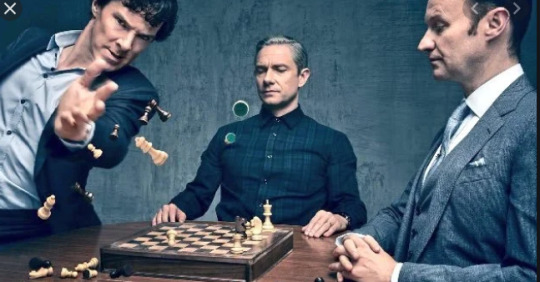
What I find interesting in all these references, is that they all seem to deal with questions regarding ‘dealing with death’ that, in the context of EMP for example, can be seen as Sherlock ‘running simulations’ (or asking philosophical questions) on how to deal with his current situations:
- ‘Do you have permission to kill people before their pre-determined time has come’? (Can people time die before their pre-determined time? Can people escape pre-determined death?)
- Can you interrupt death with love? Was Mary supposed to kill John, fell in love with him and thus his death was postponed? Is John still in danger?
- What can one do to postpone death - perhaps challenging it to a game, hoping for survival as you distract it?
Tagging other meta readers/writers who I think might enjoy this ; let me know if you don’t - I won’t tag you again): @sarahthecoat, @devoursjohnlock @inevitably-johnlocked @possiblyimbiassed @waitedforgarridebs @tjlcisthenewsexy @loudest-subtext-in-tv @therealsaintscully
15 notes
·
View notes
Text
episode origins p1
i was watching moriah earlier today and was wondering what the significance of the name moriah was, so i searched it up. i’ll explain it here in this. i wanted to learn which episodes have titles derived from pop culture, literature, etc. so i put together this list. it’s not complete, feel free to reblog with more!
why did i waste hours on my life on this, you ask? i don’t know.
season 1
pilot: obviously, all the first episodes of shows are called pilots. nothing new here.
wendigo: they’re fighting a wendigo
dead in the water: the phrase means “unable to function, move”.
phantom traveler: the name of the demon they’re fighting
bloody mary: based off the legend
skin: shapeshifters, also there might be a meta about how it’s a metaphor for dean
hook man: they’re fighting a hook man
bugs: bugs
home: they go home
asylum: they go to an asylum
scarecrow: scarecrow
faith: the concept of god first comes into play here, i thought that was pretty interesting. that’s why it’s called faith, duh. dean + faith is explored.
route 666: racist truck yes
nightmare: sam’s visions
the benders: i think it’s based off of the bloody benders, a family of serial killers
shadow: meg’s stalkery?
hell house: it was literally a hell house
something wicked: originally chanted by WITCHES in shakespeare’s macbeth. the full line is “something wicked this way comes, open locks, whoever knocks”. obviously the shtriga is a witch and it refers to that.
provenance: painting provenances, it’s in the episode
dead man’s blood: they use dead man’s blood
salvation: being saved or protected, like the boys and john do with the family
devil’s trap: the devil gets them in a trap. and they built a giant devil’s trap too.
season two
in my time of dying: based off of the led zeppelin song [x]
everybody loves a clown: based off of the gary lewis song [x]
bloodlust: i think it’s for the vampires but they were also a band in the 90′s
children shouldn’t play with dead things: based off of the 1972 movie
simon said: the whole “you do what i say” thing with andy and evil andy
no exit: it’s a song by blondie and in the episode h.h. holmes captures blondes...? am i just clowning
the usual suspects: based off of the 1995 movie
crossroad blues: based off of the robert johnson song (fave!) [x]
croatoan: i like this one. okay, so you guys probably know about the whole roanoke/croatoan thing in the 1600′s. so there’s a theory that the settlers were wiped out by a disease (similar to this town). also, the town would disappear off of the map.
hunted: gordon hunted sam
playthings: dolls, but the little girl was the grandma’s sisters plaything
nightshifter: a shifter in the night
houses of the holy: based off of the led zeppelin song and album [x]
born under a bad sign: based off of this song [x] there are a bunch of others including jimi hendrix but...?
tall tales: yeah i think this one is self explanatory
roadkill: someone got killed on the road
heart: werewolf heart but also how sam gave his heart to madison aww also there’s a band called heart
hollywood babylon: based off of the book by the same name
folsom prison blues: based off of the johnny cash song!! [x]
what is and what should never be: based off of the led zeppelin song [x]
all hell breaks loose: yes it did
season three
the magnificent seven: based off of the pretty famous western go watch
the kids are alright: based off of the who song [x]
bad day at black rock: based off of the 1955 movie
sin city: there’s a bunch of songs but the city was sinning so
bedtime stories: they were bedtime stories
red sky at morning: the full phrase is “red sky at morning, sailors take warning”. with the theme of this ep it fits pretty well.
fresh blood: fresh blood yes
a very supernatural christmas: i’m not sure. i think it’s based off of a christmas album?
malleus maleficarum: a 1400′s book of witches. latin for “hammer of the witches”.
dream a little dream of me: i love this song! based off this: [x]
mystery spot: mystery spot
jus in bello: i can’t really explain it but here [x]
ghostfacers: g h o s t f a c e r s
long-distance call: long distance call
time is on my side: based off of the rolling stones song [x]
no rest for the wicked: a biblical quote that means “evildoers will face eternal punishment”. also, “one’s work never ceases”.
season four
lazarus rising: in the bible, lazarus is the righteous man, which makes dean the righteous man. and he rises. so.
are you there, god? it’s me, dean winchester: based off of the judy blume book (maybe?), are you there, god? it’s me, margaret.
in the beginning: they go back in time
metamorphosis: with the rugaru but also sammeh
monster movie: monsters and movies
yellow fever: referring to the disease i think, but also there are a few songs
it’s the great pumpkin, sam winchester: based off of it’s the great pumpkin, charlie brown.
wishful thinking: yeah
i know what you did last summer: dean + hell, sam + ruby. is it based off of the shawn mendes song? i don’t think it is because this came out way before the song.
heaven and hell: opposite sides meet, dean’s hell experiences.
family remains: there are remains
criss angel is a douche bag: idk?
after school special: based off of the abc program? i think?
sex and violence: there was a lot of sex. and violence.
death takes a holiday: death took a holiday
on the head of a pin: i’m not sure but this article is interesting, maybe related. probably related. [x]
it’s a terrible life: based off of it’s a wonderful life? i love that movie btw
the monster at the end of this book: ughhh! yes!!! first of all there’s a sesame street book by the same title. also, chuck actually was the monster at the end of the book! that’s crazy. insane.
jump the shark: “(of a television series or movie) reach a point at which far-fetched events are included merely for the sake of novelty, indicative of a decline in quality.“ probably the whole long lost brother thing.
the rapture: a belief that christians will rise to “meet the lord in the air”. kinda like jimmy does.
when the levee breaks: based off of the led zeppelin song [x]
lucifer rising: lucifer rose
season five
sympathy for the devil: based off of the rolling stones song [x]
good god, y’all!: cas goes to find god
free to be you and me: a marlo thomas album and the brothers split up
the end: yeah it’s the end
fallen idols: i think we get it
i believe the children are our future: a lyric from a whitney houston song
the curious case of dean winchester: based off of the short story, the curious case of benjamin button.
changing channels: channels were changed. the end.
the real ghostbusters: based on the 1985 animation
abandon all hope: the full phrase is “abandon all hope, ye who enter here” and that pretty much sums up this episode.
sam, interrupted: i’m not sure?
swap meat: meats were SWAPPED.
the song remains the same: based off of the led zeppelin song [x]
my bloody valentine: based on jensen’s movie. but also the band?
dead men don’t wear plaid: based on the 1982 movie
dark side of the moon: a pink floyd album
99 problems: that one jayz song whatever
point of no return: a 1993 movie but also the poto song hehe
hammer of the gods: based off of the 1985 book i think? it’s about led zeppelin so probably yeah.
the devil you know: means that it’s better to deal with a situation you understand than one you don’t.
two minutes to midnight: this phrase is commonly used as a countdown to a global catastrophe (i.e. the fucking apocalypse)
swan song: someone’s final performance before retirement (i think this is about both brothers because it’s sam last battle and dean’s last fight before living with lisa)
season six
exile on main st.: based off of the rolling stones album [x]
two and a half men: it was a sitcom? but idk if that’s where it’s from
the third man: based off of the 1949 noir thriller? maybe? but there were also three men so idrk
weekend at bobby’s: it was a weekend at bobbys
live free or twi-hard: based off of twilight and that bruce willis movie that i watched once way back when
you can’t handle the truth: truth goddess. soulless sam gets exposed ig
family matters: based off of the 1989 sitcom? maybe
all dogs go to heaven: based off of the 1989 movie? probably
clap your hands if you believe: i think this is an original title idk
caged heat: based off of the 1974 movie i think
appointment in samarra: probably based off of the 1934 novel of the same name
like a virgin: based off of the madonna song [x]
unforgiven: sam does unforgiven things
mannequin 3: the reckoning: not sure
the french mistake: just... just read this link [x]
and then there were none: based off of the agatha christie novel of the same name
my heart will go on: y’all all know what’s up [x]
frontierland: they went to yeehaw town
mommy dearest: based on the 1981 film? maybe?
the man who would be king: based off of the 1888 novel by rudyard kipling
let it bleed: based off of the rolling stones album/song [x]
the man who knew too much: shares a name with the 1956 film
season seven
meet the new boss: they met the new boss idk
hello, cruel world: sad sam
the girl next door: there’s a 2004 romcom with the same name
defending your life: a 1991 romcom! wow!
shut up, dr. phil: sam and dean became philanthropists idk
slash fiction: hahahahaha i think we know what it means but wHY is it called that?
the mentalists: they met a bunch of magic people wow!
season 7, time for a wedding!: more like season 7, time for a slightly r*pey episode and GARTH!
how to win friends and influence monsters: based off of the 1936 book how to win friends and influence people
death’s door: they were at death’s door idk
adventures in babysitting: based off of the 1987 movie by the same name
time after time after time: based off of the cyndi lauper song? [x]
the slice girls: prolly based off of the spice girls idk
plucky pennywhistle’s magic menagerie: yeah idk
repo man: it’s a 1984 film too
out with the old: they were fucking around with antiques
the born-again identity: obviously based off of the bourne identity which i haven’t seen in forever
party on, garth: hahaha
of grave importance: it was very important
the girl with the dungeons and dragons tattoo: probably based off of the movie/book the girl with the dragon tattoo.
reading is fundamental: reading is fundamental. go read a book.
there will be blood: there was blood
survival of the fittest: everybody fought idk
okay i’m gonna stop here for this one because i’m tired asf and i’ll do part 2 later
8 notes
·
View notes
Text
Painting Per Episode Master List
I’m painting a picture per episode of Supernatural to improve my digital painting skills! Each painting uses a screencap as a reference. I’ll add links to paintings for each episode as I complete them.
The reference screencap gets posted with each painting over on my Twitter account, and I make step by step gifs of my painting process for each episode as well.
Enjoying my work? Please consider supporting me on Patreon. It’s a “pledge any amount you want” type of situation, and I’m jobless at the moment, so I appreciate it very, very much. ♥ For one-time tips, see also: buy me a Ko-Fi?
Okay, here's the episode list proper. As you can see, this project’s gonna take me awhile:
Season 1:
1 - Pilot | 2 - Wendigo | 3 - Dead in the Water | 4 - Phantom Traveler | 5 - Bloody Mary | 6 - Skin | 7 - Hook Man | 8 - Bugs | 9 - Home | 10 - Asylum | 11 - Scarecrow | 12 - Faith | 13 - Route 666 | 14 - Nightmare | 15 - The Benders | 16 - Shadow | 17 - Hell House | 18 - Something Wicked | 19 - Provenance | 20 - Dead Man’s Blood | 21 - Salvation | 22 - Devil’s Trap
Season 2:
1 - In My Time of Dying | 2 - Everybody Loves a Clown | 3 - Bloodlust | 4 - Children Shouldn’t Play With Dead Things | 5 - Simon Said | 6 - No Exit | 7 - The Usual Suspects | 8 - Crossroad Blues | 9 - Croatoan | 10 - Hunted | 11 - Playthings | 12 - Nightshifter | 13 - Houses of the Holy | 14 - Born Under a Bad Sign | 15 - Tall Tales | 16 - Roadkill | 17 - Heart | 18 - Hollywood Babylon | 19 - Folsom Prison Blues | 20 - What Is and What Should Never Be | 21 - All Hell Breaks Loose: Part 1 | 22 - All Hell Breaks Loose: Part 2
Season 3:
1 - The Magnificent Seven | 2 - The Kids Are Alright | 3 - Bad Day at Black Rock | 4 - Sin City | 5 - Bedtime Stories | 6 - Red Sky at Morning | 7 - Fresh Blood | 8 - A Very Supernatural Christmas | 9 - Malleus Maleficarum | 10 - Dream a Little Dream of Me | 11 - Mystery Spot | 12 - Jus in Bello | 13 - Ghostfacers | 14 - Long Distance Call | 15 - Time is on My Side | 16 - No Rest for the Wicked
Season 4:
1 - Lazarus Rising | 2 - Are You There, God? It’s Me, Dean Winchester | 3 - In the Beginning | 4 - Metamorphosis | 5 - Monster Movie | 6 - Yellow Fever | 7 - It’s the Great Pumpkin, Sam Winchester | 8 - Wishful Thinking | 9 - I Know What You Did Last Summer | 10 - Heaven and Hell | 11 - Family Remains | 12 - Criss Angel is a Douche Bag | 13 - After School Special | 14 - Sex and Violence | 15 - Death Takes a Holiday | 16 - On the Head of a Pin | 17 - It’s a Terrible Life | 18 - The Monster at the End of This Book | 19 - Jump the Shark | 20 - The Rapture | 21 - When the Levee Breaks | 22 - Lucifer Rising
Season 5:
1 - Sympathy for the Devil | 2 - Good God, Y’All | 3 - Free to Be You and Me | 4 - The End | 5 - Fallen Idols | 6 - I Believe the Children Are Our Future | 7 - The Curious Case of Dean Winchester | 8 - Changing Channels | 9 - The Real Ghostbusters | 10 - Abandon All Hope | 11 - Sam, Interrupted | 12 - Swap Meat | 13 - The Song Remains the Same | 14 - My Bloody Valentine | 15 - Dead Men Don’t Wear Plaid | 16 - Dark Side of the Moon | 17 - 99 Problems | 18 - Point of No Return | 19 - Hammer of the Gods | 20 - The Devil You Know | 21 - Two Minutes to Midnight | 22 - Swan Song
Season 6:
1 - Exile on Main St. | 2 - Two and a Half Men | 3 - The Third Man | 4 - Weekend at Bobby’s | 5 - Live Free or Twihard | 6 - You Can’t Handle the Truth | 7 - Family Matters | 8 - All Dogs Go to Heaven | 9 - Clap Your Hands If You Believe | 10 - Caged Heat | 11 - Appointment in Samarra | 12 - Like a Virgin | 13 - Unforgiven | 14 - Mannequin 3: The Reckoning | 15 - The French Mistake | 16 - And Then There Were None | 17 - My Heart Will Go On | 18 - Frontierland | 19 - Mommy Dearest | 20 - The Man Who Would Be Kind | 21 - Let it Bleed | 22 - The Man Who Knew Too Much
Season 7:
1 - Meet the New Boss | 2 - Hello, Cruel World | 3 - The Girl Next Door | 4 - Defending Your Life | 5 - Shut Up, Dr. Phil | 6 - Slash Fiction | 7 - The Mentalists | 8 - Season Seven, Time for a Wedding! | 9 - How to Win Friends and Influence Monsters | 10 - Death’s Door | 11 - Adventures in Babysitting | 12 - Time After Time | The Slice Girls | 14 - Plucky Pennywhistle’s Magical Menagerie | 15 - Repo Man | 16 - Out with the Old | 17 - The Born-Again Identity | 18 - Party On, Garth | 19 - Of Grave Importance | 20 - The Girl With the Dungeons and Dragons Tattoo | 21 - Reading is Fundamental | 22 - There Will Be Blood | 23 - Survival of the Fittest
Season 8:
1 - We Need to Talk About Kevin | 2 - What’s Up, Tiger Mommy? | 3 - Heartache | 4 - Bitten | 5 - Blood Brother | 6 - Southern Comfort | 7 - A Little Slice of Kevin | 8 - Hunteri Heroici | 9 - Citizen Fang | 10 - Torn and Frayed | 11 - LARP and the Real Girl | 12 - As Time Goes By | 13 - Everybody Hates Hitler | 14 - Trial and Error | 15 - Man’s Best Friend with Benefits | 16 - Remember the Titans | 17 - Goodbye, Stranger | 18 - Freaks and Geeks | 19 - Taxi Driver | 20 - Pac-Man Fever | 21 - The Great Escapist | 22 - Clip Show | 23 - Sacrifice
Season 9:
1 - I Think I’m Gonna Like It Here | 2 - Devil May Care | 3 - I’m No Angel | 4 - Slumber Party | 5 - Dog Dean Afternoon | 6 - Heaven Can’t Wait | 7 - Bad Boys | 8 - Rock and a Hard Place | 9 - Holy Terror | 10 - Road Trip | 11 - First Born | 12 - Sharp Teeth | 13 - The Purge | 14 - Captives | 15 - #thinman | 16 - Blade Runners | 17 - Mother’s Little Helper | 18 - Meta Fiction | 19 - Alex Annie Alexis Ann | 20 - Bloodlines | 21 - King of the Damned | 22 - Stairway to Heaven | 23 - Do You Believe in Miracles?
Season 10:
1 - Black | 2 - Reichenbach | 3 - Soul Survivor | 4 - Paper Moon | 5 - Fan Fiction | 6 - Ask Jeeves | 7 - Girls, Girls, Girls | 8 - Hibbing 911 | 9 - The Things We Left Behind | 10 - The Hunter Games | 11 - There’s No Place Like Home | 12 - About a Boy | 13 - Halt & Catch Fire | 14 - The Executioner’s Song | 15 - The Things They Carried | 16 - Paint It Black | 17 - Inside Man | 18 - Book of the Damned | 19 - The Werther Project | 20 - Angel Heart | 21 - Dark Dynasty | 22 - The Prisoner | 23 - Brother’s Keeper
Season 11:
1 - Out of the Darkness, Into the Fire | 2 - Form and Void | 3 - The Bad Seed | 4 - Baby | 5 - Thin Lizzie | 6 - Our Little World | 7 - Plush | 8 - Just My Imagination | 9 - O Brother, Where Art Thou? | 10 - The Devil in the Details | 11 - Into the Mystic | 12 - Don’t You Forget About Me | 13 - Love Hurts | 14 - The Vessel | 15 - Beyond the Mat | 16 - Safe House | 17 - Red Meat | 18 - Hell’s Angel | 19 - The Chitters | 20 - Don’t Call Me Shurley | 21 - All in the Family | 22 - We Happy Few | 23 - Alpha and Omega
Season 12:
1 - Keep Calm and Carry On | 2 - Mamma Mia | 3 - The Foundry | 4 - American Nightmare | 5 - The One You’ve Been Waiting For | 6 - Celebrating the Life of Asa Fox | 7 - Rock Never Dies | 8 - LOTUS | 9 - First Blood | 10 - Lily Sunder Has Some Regrets | 11 - Regarding Dean | 12 - Stuck in the Middle (With You) | 13 - Family Feud | 14 - The Raid | 15 - Somewhere Between Heaven and Hell | 16 - Ladies Drink Free | 17 - The British Invasion | 18 - The Memory Remains | 19 - The Future | 20 - Twigs & Twine & Tasha Banes | 21 - There’s Something About Mary | 22 - Who We Are | 23 - All Along the Watchtower
Season 13:
1 - Lost and Found | 2 - The Rising Son | 3 - Patience | 4 - The Big Empty | 5 - Advanced Thanatology | 6 - Tombstone | 7 - War of the Worlds | 8 - The Scorpion and the Frog | 9 - The Bad Place | 10 - Wayward Sisters | 11 - Breakdown | 12 - Various & Sundry Villains | 13 - Devil’s Bargain | 14 - Good Intentions | 15 - A Most Holy Man | 16 - ScoobyNatural | 17 - The Thing | 18 - Bring ‘Em Back Alive | 19 - Funeralia | 20 - Unfinished Business | 21 - Beat the Devil | 22 - Exodus | 23 - Let the Good Times Roll
Season 14:
1 - Stranger in a Strange Land | 2 - Gods and Monsters | 3 - The Scar | 4 - Mint Condition | 5 - Nightmare Logic | 6 - Optimism | 7 - Unhuman Nature | 8 - Byzantium | 9 - The Spear | 10 - Nihilism | 11 - Damaged Goods | 12 - Prophet and Loss | 13 - Lebanon | 14 - Ouroboros | 15 - Peace of Mind | 16 - Don’t Go in the Woods | 17 - Game Night | 18 - Absence | 19 - Jack in the Box | 20 - Moriah
Season 15:
1 - Back and to the Future | 2 - Raising Hell | 3 - The Rupture | 4 - Atomic Monsters | 5 - Proverbs 17:3 | 6 - Golden Time | 7 - Last Call | 8 - ??? | 9 - ??? | 10 - ??? | 11 - ??? | 12 - ??? | 13 - ??? | 14 - ??? | 15 - ??? | 16 - ??? | 17 - ??? | 18 - ??? | 19 - ??? | 20 - ???
#painting per episode#threshasketch#supernatural#threshie#master list#yes I DID lovingly hand type in every single episode title#and good golly season 2 liked long titles!#spn#digital painting
103 notes
·
View notes
Text
Chess against Death -
Can Samarra be avoided?
I was just reading an excellent meta by @ebaeschnbliah, when something occurred to me like an epiphany. Maybe this has already been discussed in fandom, but since I haven’t seen it yet, here it goes.
@ebaeschnbliah‘s meta is about how Sherlock is confronted with death and dying throughout the show, and also how this is related to the promo pictures for S4, where Sherlock is playing a game of chess with Mycroft, while John is watching. They seem to be allegorically playing The Game, which is definitely a recurring theme in Sherlock.

And if Mycroft represents Sherlock’s own brain, he’s probably playing with himself (his worst enemy, according to Mycroft in TAB).
At the end of the meta, @ebaeschnbliah questions whether the game is still on, because on one of the promo pictures, Sherlock throws the chess pieces through the air. Wouldn’t that end the Game?
Actually, now I believe it doesn’t – the game is still on! Because I have a feeling this whole chess theme might actually be inspired by an old movie about a man who plays chess with Death, an ‘epic historical fantasy film’ from 1957 called The Seventh Seal.
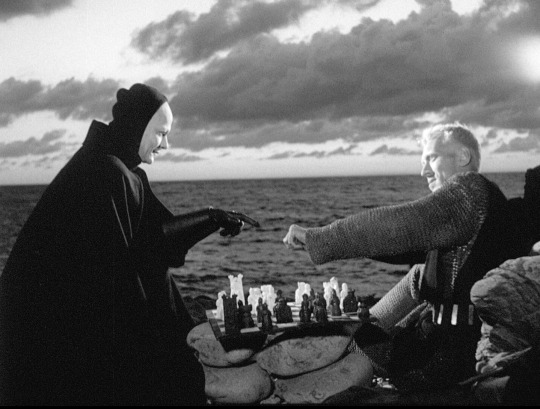
More under the cut.
The Seventh Seal is written by Swedish director Ingemar Bergman, (more about the film here).
It’s rather ‘dark’ and, like many other of Bergman’s productions, brings up existential issues. It takes place in the 14th century, when the great plague known as the Black Death is wreaking havoc, killing 30–60% of Europe's total population. The main character, Antonius Block, is a knight who returns from the crusades together with his squire, only to find his country infected by the disease and the religious fanaticism and panic that follows in its wake.
Death is waiting for Block, but he manages to bargain by telling Death that he’s not ready yet, he wants time to use for one single meaningful act before he dies. And in the mean time Block challenges Death to play a game of chess. As long as he can resist in the game, Block gets to live, and if he wins, he and his family walk free from Death. But if he looses, Death can take him right away. Death consents, and they start to play.
This chess-against-death theme is rather pervasive in BBC Sherlock I think; as @ebaeschnbliah points out, the show begins (ASiP) with Sherlock playing a game of life and death with a serial killer, a murdering cab driver, who refers to a game with poison pills as chess:
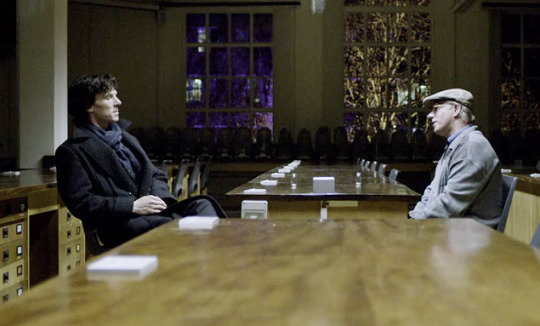
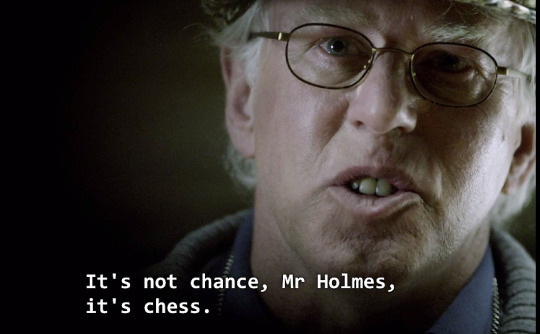
And maybe it’s significant that the cab driver’s last name is Hope, because the chess game gives an illusion of hope for the victim; if Sherlock wins (supposedly by making the right choice), the killer gets the bad pill and dies, and Sherlock walks free - just like Block the knight in The Seventh Seal.
In this trailer (almost 10 minutes long; source or the screencaps) you can get a good idea of what The Seventh Seal is about.
Block the knight says he wants to know things before he dies.
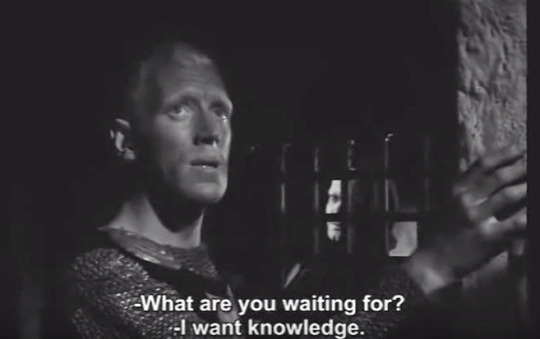
He has lost his faith because of what he’s seen in the world, and he wants knowledge instead.
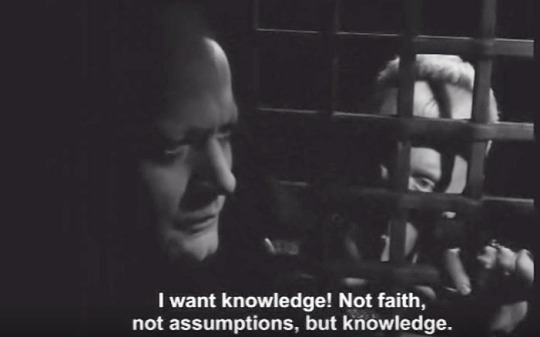
Like Block, Sherlock can’t resist the temptation to play the deadly game, because he wants to know. He thinks he needs to know how Jeff Hope thinks and the reason why, so he questions him and makes a series of deductions:

And after his deductions Sherlock comes to the conclusion that “love is a vicious motivator”.
But ‘the game’ is mentioned repeatedly all throughout the series, and it’s clear that Sherlock is given a respite from death, just like Block in The Seventh Seal. Apart from John saving Sherlock from the Bad Pill by killing Jeff Hope, @ebaeschnbliah points out several other occasions in their meta, like this one in TGG/ASiB:
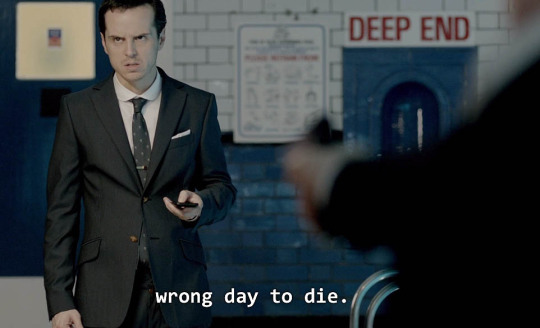
T6T also repeats the chess game of death in depicting the British Ambassador playing chess with her husband, while they are held as hostages in their Embassy in Tblisi, Georgia, during a terrorist attack. The death threat while playing chess is very tangible in this scene, where one terrorist is pointing his gun at the couple:
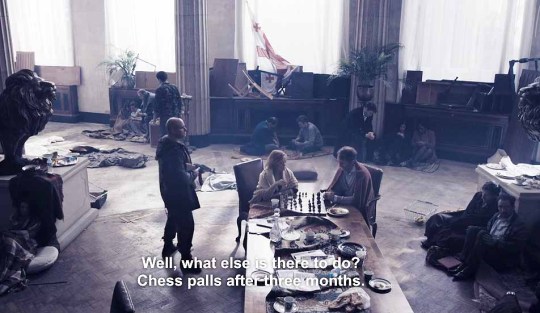
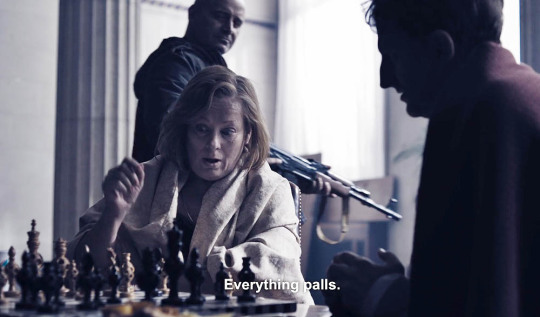
Madame Ambassador is extremely bored (like Sherlock) after three months. But she says she’s got a secret weapon if only they can get out of the siege situation; Amo - which means Love, codename for Lady Smallwood.
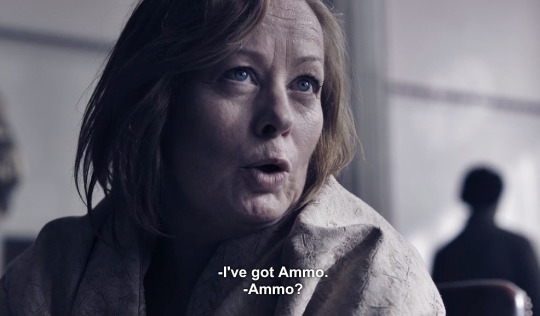
(Since I believe this is all happening inside Sherlock’s mind, and Madame Ambassador is a mirror for Sherlock, the subtextual meaning of this could be that Love is a secret weapon Sherlock can use against his enemies, but he needs to get out (=wake up from coma) first. But I admit I don’t really 'get’ what Amo is supposed to mean on a textual level).
Sadly, we know what happens next; the diplomatic couple gets killed under a counterattack from the AGRA agents, because they were betrayed by one of their own. So Death won their game, so to speak.
Yet another version of the same theme, also in T6T, is the story of Death in Samarra that Sherlock tells, which I believe is pretty much in line with the story in The Seventh Seal:
“There was once a merchant in the famous market at Baghdad. One day he saw a stranger looking at him in surprise. And he knew that the stranger was Death. Pale and trembling, the merchant fled the marketplace and made his way many, many miles to the city of Samarra, for there he was sure Death could not find him. But when at last he came to Samarra, the merchant saw, waiting for him, the grim figure of Death. ‘Very well,’ said the merchant. ‘I give in. I am yours. But tell me: why did you look surprised when you saw me this morning in Baghdad?’ ‘Because,’ said Death, ‘I had an appointment with you tonight – in Samarra.’”
At the end of T6T, when Sherlock thinks he has lost John’s friendship because ‘Mary’ (supposedly) took a bullet for him – making him escape death again - he reflects over whether he can escape Death at all:
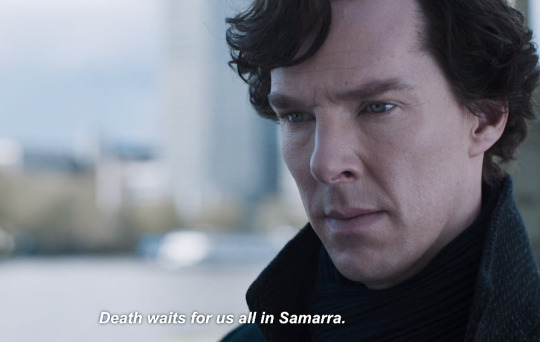
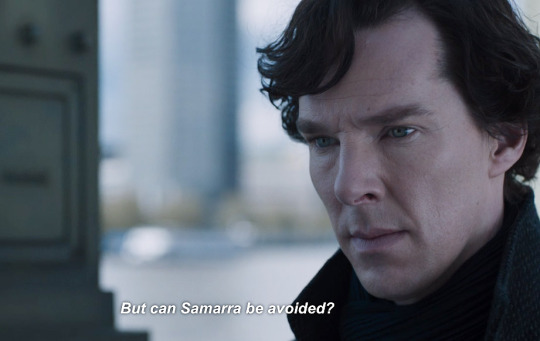
But here’s the thing: according to Mycroft in TST, Sherlock invented his own version of this tale when he was a kid; he told himself a better story; ‘Appointment in Sumatra’. The merchant goes to a different city and is perfectly fine.
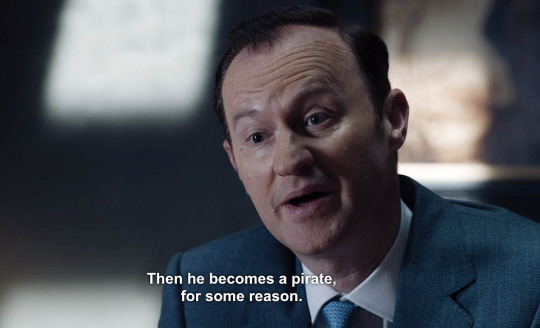
I believe this has to do with Sherlock ‘s childhood trauma; in T6T he also tells Karim in Morocco that he’s not familiar with the concept ‘happy family’. Something must have happened in his family past that has bearing on Samarra/Sumatra. So maybe what Sherlock can try to do is go back to his childhood, emulate his childhood ‘pirate’ self, and totally avoid the place where Death awaits him. I get a feeling that’s actually what he did in TFP, but I don’t think the mystery is completely solved just yet, even if he did solve the Musgrave ritual. Exactly how he is going to do it, I don’t know. But I do believe it will have to do with Amo – perhaps a love that isn’t betrayed this time.
In The Seventh Seal, Block confesses to a (supposed) priest, that he feels alienated towards other people, which I think is very much a resemblance to Sherlock’s problems with repressed feelings and lack of expressed compassion:
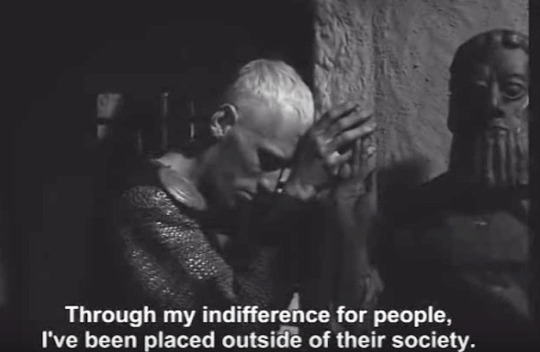
And Block feels trapped inside himself, which I also believe relates directly to Sherlock being trapped in his own mind palace in S4, with ghosts as his only company:
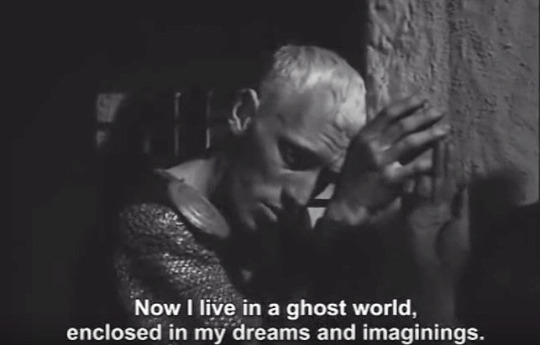
He also tells the priest how he intends to outsmart Death in the chess game. But since the priest is actually Death, he now gets to know Block’s tactics.
And maybe this is the key; Sherlock can’t outsmart death, trapped inside his own brain. It doesn’t matter how smart he is, this is about emotions, and he must wake up and come out to the real world and get in contact with ‘some people on the ground’.
Block and his squire get to know a family of jesters with their little child, and this family stands out to them with their kind and uncomplicated ways and very moving love for each other. Block wants to save this little family as his last meaningful act before he dies. But the Black Death is hunting people down everywhere, and since Block is now loosing his chess game, the prospects look bad for all his companions, including the jester family that travels with them.
At the end of the movie, the knight’s time is almost up. But then Block plays a last, desperate trick to distract death; he knocks the pieces over to buy time. And while this is happening, the jester family manages to escape.
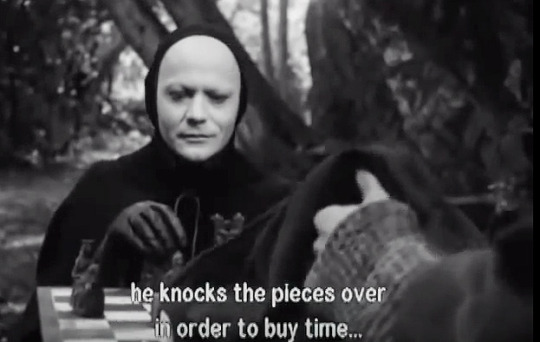
Which very much resembles what happens in this promo picture, doesn’t it?

In The Seventh Seal Death simply puts the pieces back in place again on the chess board, and finally wins over Block. Which doesn’t matter much to him, since he already has managed to do his single, meaningful act before he dies; saving a whole family.
But this is precisely what I don’t think will happen in Sherlock. Because Sherlock already tried this in TRF (‘committing suicide’ with the delusion that this would protect John), and it didn’t work; it nearly destroyed John and ultimately made Sherlock lose him. And on John’s blog (which I believe better reflects ‘reality’ than the TV show) it says #sherlocklives means #johnwatsonlives. Which means that Sherlock’s only way to save John Watson is by staying alive. I do think that Sherlock is nearly dying in S4, and The Final Problem is about staying alive. Which I think he has managed this far, but if Sherlock is playing chess against his own brain (=Mycroft) with his heart looking on (=John), he can’t outsmart his own brain. And at the end of HLV Sherlock says to John “the game is never over”.
So maybe Sherlock has to continue playing ‘the game’ also into S5. Fortunately, in Chess there’s something called a draw, which might be the solution here; a tie, a truce, an agreement between Sherlock’s heart and brain, with mutual respect preserved. And maybe Sherlock has managed to buy some time by knocking over the pieces, so no-one has to die, ‘everybody lives!’ (as the Doctor would say in DW ;) )
Block says in The Sevent Seal that he knows that Death plays chess because he has seen it in paintings. Here’s the medieval church painting (15th century, by Albertus Pictor) that allegedly inspired Bergman to film this theme:
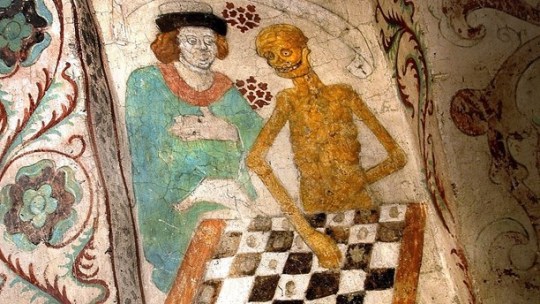
Which means that the theme with Death playing chess is actually quite old.
Here is also an interview with Bergman about The Seventh Seal. Particularly interesting, in my opinion, is the part at about 7 minutes into the interview, where Bergman is talking about film ’reality’ and the audience believing in it. According to this other guy in the video clip, Bergman got the question: “What is he trying to do when he makes a film?” And Bergman answered: “Well, I’m not trying to make it real, I’m trying to make it alive”. I have a distinct feeling that the same goes for Mofftiss.
Source of chess promo pictures (X)
Tagging some folks who might be interested: @sagestreet @sarahthecoat @gosherlocked @raggedyblue @88thparallel @darlingtonsubstitution @tjlcisthenewsexy @sherlockshadow @consultingidiots @monikakrasnorada @loveismyrevolution @sectoralheterochromiairidum
#Chess against death#Can Samarra be avoided?#the seventh seal#sherlock meta#john=sherlock's heart#mycroft=sherlock's brain
143 notes
·
View notes
Photo

Mental Health As a responsible member of this struggling yet thriving society, we start a small initiative today. This is not for engagement; not for marketing; and not for promotion. This is our humble attempt at building perspective on mental health. We will do it through stories & examples- fictional & real. Any person who relates to this can share stories of their own or a story. You never know who needs to hear it from you. Appointment in Samarra by John O Hara- the novel concerns with the self destruction of the fictional character named Julian English. Interesting fact: The book's title is in reference to W. Somerset Maugham's re-telling of an ancient Mesopotamian tale which was also told in the form of an epigraph in the book. It goes: "A merchant in Baghdad sends his servant to the marketplace for provisions. Soon afterwards, the servant comes home white and trembling and tells him that in the marketplace, he was jostled by a woman, whom he recognized as Death, who made a threatening gesture. Borrowing the merchant’s horse, he flees at great speed to Samarra, a distance of about 75 miles (125 km), where he believes Death will not find him. The merchant then goes to the marketplace and finds Death, and asks why she made the threatening gesture to his servant. She replies, “That was not a threatening gesture, it was only a start of surprise. I was astonished to see him in Baghdad, for I have an appointment with him tonight in Samarra.” If you're wondering why this story is making a big feature in a #mentalhealth post, here's your answer- it is easy to start humoring a pessimistic line of thought based on something we see, or even believe that we have seen. But what's important is to be aware that the consequence of thought may or may not be action, but the consequence of action is almost certainly going to be another action. Being aware that you are human makes you for real. #mentalhealth #mentalhealthawareness #mentalhealthmatters #iamforreal #ReleaseYourInnerTalent #skillsforlife #likeforlikes (at London, Unιted Kingdom) https://www.instagram.com/p/CLeFeHtA-rb/?igshid=1nv8cngsoryjk
#mentalhealth#mentalhealthawareness#mentalhealthmatters#iamforreal#releaseyourinnertalent#skillsforlife#likeforlikes
0 notes
Text
Sherlock and Rewriting Stories
Storytelling has always been an important element of the show. Think of Rich Brook, the storyteller, and John who is telling their stories on the blog and knows when he is in one. But in S4 we get a new theme - rewritten stories.
MYCROFT: You wrote your own version, as I remember. Appointment in Sumatra. The merchant goes to a different city and is perfectly fine. SHERLOCK: Goodnight, Mycroft. MYCROFT: Then he becomes a pirate, for some reason.
ADULT EURUS: You were upset … so you told yourself a better story.
JIM: I wrote my own version of the nativity when I was a child. “The Hungry Donkey.” It was a bit gory but, if you’re gonna put a baby in a manger, you’re asking for trouble.”
The concept of rewriting stories you do not like for some reason is a common theme in series 4 and is presented as another parallel between Sherlock and Jim. But this is just the surface reading because their motives differ profoundly and serve as further evidence of the fundamental differences between them.
Jim rewrites the nativity - a story of peace and hope - into a gory tale about a donkey eating the baby Jesus. Of course it is presented tongue-in-cheek and with his usual devilish charm but it is still about good becoming evil.
Sherlock on the other hand is concerned with rewriting the Samarra story because he hated the idea of predestination and not being able to outrun one’s supposed fate. So he creates his own version in which the merchant is saved and, in order to fulfill Sherlock’s romantic ideas, becomes a pirate.
So far this has been about rewriting religious or literary stories. But Sherlock does not stop there. He has rewritten parts of his own life, the parts which have caused heartbreak and have changed him irrevocably. He could not accept the fact that his own sister killed his best friend and he himself was unable to save Victor. So he created a better story, the story of a dog who was his constant companion.
But, as ever with the show, we are challenged to question this perception. Because did he really create a better story if the one central fact we learn about Redbeard is that he died, that he had to be put down? When Mycroft reminds Sherlock during the wedding, this is meant as a warning. He reminds Sherlock that loving someone will inevitably result in heartbreak. It is interesting because Mycroft is walking a very thin line by referring to the rewritten version of Sherlock’s childhood.
Conclusion: I think that the recurring theme of rewritten stories may hint at large parts - or all of S4 - not being real. Sherlock is still rewriting the story of his own life, trying to anticipate people’s responses in “scenarios” he “devised”, knowing “of at least fifty-eight techniques to refine this seemingly infinite array of randomly generated possibilities down to the smallest number of feasible variables”.
(P. S. - an afterthought: we should not forget Mycroft rewriting part of Sherlock’s story by falsifying the Appledore evidence. This is different from the above examples because someone else is rewriting a person’s story instead of the person doing it themselves. The fact that Sherlock does not seem to be happy with this proves that he wants to be master of his own storytelling.)
@ebaeschnbliah, @monikakrasnorada, @loveismyrevolution, @tjlcisthenewsexy, @may-shepard, @shadow3214, @sanmaryt, @jenna221b
85 notes
·
View notes
Text
Obviously Fake
Or how Moffit and Gatiss irritated all of their fans. Really. All of them, no lie.
I am just going to start to call TFP the Obvioulsy Fake Episode. OFE. I do think there is something fishy going on. There has been complete radio silence from TPTB. I would think that with ALL the bad press, they would, at some point, make a statement.
All who know me on here know I am a EMP/EDT supporter.
What do we say about coincidence? The universe is rarely so lazy. SO the balance of probabilty is? Someone went to great lengths to mislead, they lied.
I wish I knew more about the Horror genre, but since I have seen some real horror in my life, I do not watch it, regardless of my being a movie buff. I have really no idea about The Ring and its character Samara.
Appointment in Samarra/paraphrased form Wikipedia
‘- reference to W. Somerset Maugham's retelling of an ancient Mesopotamian tale, A merchant in Baghdad sends his servant to the marketplace for provisions, where he is jostled by a woman, whom he recognizes as Death, and she makes a threatening gesture. Borrowing a horse, he flees at great speed to Samarra, where he believes Death will not find him. The merchant then goes to the marketplace and finds Death, and asks why she made the threatening gesture. She replies, "That was not a threatening gesture, it was only a start of surprise. I was astonished to see him in Baghdad, for I had an appointment with him tonight in Samarra." ‘
Death is a woman. The Abominal Bride. Amo. Obviously. We told you, but did you listen?
As a pround member of the Tin Hat Irregulars. THI, since all the best sociaties have an acronym and all the ladies love a solider, I am calling bullshit on TFP.
BULLSHIT. BULLSHIT. BULLSHIT. BULLSHIT. BULLSHIT.
Making history? A popular TV show with a rabid following, smart and clever (writers and fans) makes TV history in a way not know before and interacts with the public on Twitter, Facebook, Tumber, Redditt and the like. TV show creators post mini-sodes, Special Christmas Movies and mysteries for people to solve on line. New in the history of entertainment. Not to mention the cons.
The final problem is that we have a fake episode. Yeah its a cliffhanger, because WTF is next and when? Now? while you have our attention? In a few years? Never, because you may not have the time?
OK My “Baker Street Boys”
and Arwel “Sorry I just really like elephants!”
Not buying what you guys are selling.
Lots and lots of symbolism. We had loads of fun, but now we are tired, and it’s not a game anymore.
@yan-yae @schrodingers-johnlock @schrodingersjohnlock @salve-regina-mills
@tendergingergirl @shawleyleres
Sorry if I forgot anyone. In a hurry.
32 notes
·
View notes
Text
Appointment in Sussex
So there are a lot of endgame theories out there. I thought I would throw out my own. I did make reference to this as kind of a joke, but I thought I’d lay my actual, proper thoughts out there.
So, a lot of attention was drawn to The Appointment in Samarra. I initially thought “Ooh, does this mean Sherlock is going to die in The Final Problem? I mean, The Final Problem is the story where Holmes supposedly dies. Maybe this time it’s going to be permanent.”
But was thinking some more. Sherlock doesn’t have an appointment in Samarra. He has an appointment in Sussex. It’s well known that canonically Holmes retires there to raise bees.
I couldn’t get the thought out of my head about a major death. This may possibly be the last season. In fact, they’ve been alluding to the fact it could be very hard to continue on where they leave it off in this season. They’ve also called this season groundbreaking, dark and sad. Then I was thinking about Sherlock’s vow to John, Mary and Rosie.
I think I was right on a main character dying, but I don’t think it’s going to be Sherlock. I think it’s going to be John.
The first episode sets things up as very dark for John. He’s making bad choices and he’s made himself look incredibly unlikeable to a lot of fans. Dying to save Sherlock, Rosie and other friends might be able to redeem him.
We’ve also already seen John mourning Sherlock’s death. It is kind of just a reset to the end of Series Two if they do that again. But we’ve never seen Sherlock mourning John’s death. In fact, we haven’t seen this in a lot of adaptations (”Mr Holmes” is the only one that springs to mind off the top of my head and Holmes was portrayed as a very old man in that). It would be incredibly groundbreaking to kill Watson off on screen.
While John’s death would be heartbreaking, it would also give a very good reason for Sherlock to retire: His vow. After losing John, he would realize that he can never keep that vow while he’s still working cases. He needs to retire to the country to raise John and Mary’s daughter. This would also explain why Rosie was introduced into the story: To give Sherlock someone to take care of. The idea of Sherlock and John running around London solving crimes, while Mrs Hudson and Molly alternate between taking care of Rosie is a ridiculous notion. Instead, Rosie is an endgame scenario. She’s there so that a couple of years down the road, Sherlock can read John’s blog to her, regaling her with tales of himself and her father.
Could John regale Rosie with tales of Sherlock? Yeah, I suppose. But it lacks the emotional punch. There’s nothing shocking in a father taking care of his daughter. But having Sherlock Holmes-- the man people call a robot, a being of pure logic-- giving it all up to raise his best friends’ daughter? That’s heartbreakingly beautiful.
I’m not saying this is a certainty. This is just a theory I’m throwing out there in the Tumblrverse.
198 notes
·
View notes
Text
ok here we go
some sherlock meta for the six thatchers below Everything we see/hear after Sherlock says the words, "The game is on" 1/3 through the episode is a lie or at least our viewpoint is considerably distorted.
alright first go read this post which is what half led me to this theory So at the beginning of the episode Sherlock mentions to Smallwood that Moriarty has "planned something longterm" and has anticipated a "posthumous game". Sherlock is clearly going to be thinking about what Moriarty is up to throughout the episode and is his one true focus, and we can interpret the episode from that viewpoint. Smallwood then asks Sherlock what he plans to do about Moriarty to which he replies, "Wait. Of course wait. I'm the target, targets wait. Look whatever's coming, whatever he's lined up, I'll know when it begins." "I always know when the game is on." SO we can assume that the entire build up to "the game" Moriarty has created is Sherlock planning for and anticipating when he will recognize Moriarty's involvement or movement to which he finally does when he recieves the crushed Thatcher bust from Lestrade and says the exact words "The game is on." From this point on we can assume that the rest of the episode is a "game" or possibly some sort of distorted version Sherlock has orchestrated in order to protect John who Moriarty always vowed to destory: ("burn the heart out of you"). Is Mary's death apart of this orchestration? Not sure. After Sherlock says "the game is on" Mary soon shows up with her baby in a white rabbit costume. Very specific and pretty odd. I assume this is a reference to the white rabbit in Alice in Wonderland in which case we are Alice being led down the rabbit hole into a distorted version of events. The baby in the white rabbit costume is the signal that the rest of the episode will be Sherlock's distortion. So, Sherlock's orchestration is somehow his way of foiling Moriarty and moving against him and somehow distorting the appearence of the events is helping Sherlock in some way. Sherlock also wanting to change the ending to "Appointment in Samarra" also supports this theory in that this episode is the tale that he's written himself to suit his purposes. Not entirely sure what's real and what's not in that sense, but it could lend meaning to John's OOC actions with the bus woman and Mary's death. What I still haven't figured out is why Sherlock says "I'll know when it begins. Because I love it". Seems sort of OOC for Sherlock to use to the word love in that context? And his code name is Love also? (along with the analogy in throughout the episode that love is a weapon?) Lemme know what you think.
6 notes
·
View notes
Text
Re-rewatching S06E11 - Appointment in Samarra
Appointment in Samarra is book by John O’hara. The title is a reference to W. Somerset Maugham’s retelling of an old Mesopotamian tale. In John O’hara’s book the story appears as the following epigraph -
A merchant in Baghdad sends his servant to the marketplace for provisions. Soon afterwards, the servant comes home white and trembling and tells him that in the marketplace, he was jostled by a woman, whom he recognized as Death, who made a threatening gesture. Borrowing the merchant’s horse, he flees at great speed to Samarra, a distance of about 75 miles (125 km), where he believes Death will not find him. The merchant then goes to the marketplace and finds Death, and asks why she made the threatening gesture to his servant. She replies, “That was not a threatening gesture, it was only a start of surprise. I was astonished to see him in Baghdad, for I have an appointment with him tonight in Samarra.
That is one amazing tale and I don’t think anything could better describe what this episode is about.
Appointment in Samarra sees Dean trying to make a deal with Death to get Sam’s soul back. Death will retrieve Sam’s soul and put his memories of Hell behind a wall if Dean can be Death for 24 hours.
Dean: Okay, a wall. Sounds good.
Tessa: But it's not permanent.
Death: She's right. Nothing lasts forever. Well, I do.
Famous last words.
So, Dean starts off on a journey. His first death is an armed burglar who he is more than happy to take. His second is a heart attack waiting to handle but his third is a young girl suffering from a debilitating heart condition and she is the only family her father has and Dean decides that if he is Death than that little girl isn’t dying tonight.
But, letting the girl live causes a chain reaction. The girl gets better when she doesn’t die, so she doesn’t undergo surgery, her nurse goes back home early and gets involved in a car crash and is on her death bed and Dean has to kill her so that he can prevent another chain reaction. The nurse’s death hits her husband so hard that he gets behind the wheel drunk and Dean realises that he is going to die but as long as he is Death he can’t do anything so he takes off the ring and stops the guy from getting himself killed.
I guess we have often said that Dean will practically puts his life on the line for anyone he thinks deserves to live and he does so here. Of course, it also can be argued that the guy was only in danger of dying because Dean didn’t do his job. Anyhow, he goes back and kills the little girl to prevent any more dominos from toppling over.
I have never really undertsood what purpose this episode served until today and it really makes sense in the bigger picture that Dean atleast learn what havoc the Winchesters wreck on the natural order.
Death: This is hard for you, Dean. You throw away your life because you've come to assume that it'll bounce right back into your lap. The human soul is not a rubber ball. It's vulnerable, impermanent, but stronger than you know... and more valuable than you can imagine.
Sam, on the other hand, is working hard to scar his vessel so that a soul can never inhabit it and doing so requires him to commit patricide. So, Sam goes after Bobby.
Dean, thankfully, arrives in the nick of time and manages to save Bobby but they both find themselves at a loss for what to do about Sam when Death comes back and tells Dean that he is going to give Sam’s soul back.
Soulless Sam has been loads of fun but it’s the advent of soulful Sam now.
#supernatural#spn#supernatural season 6#spn 6x11#appointment in samarra#dean#sam#tessa#death#bobby#myposts#spn rewatch
1 note
·
View note
Text
Appointment with Life
In season eleven of Agatha Christie’s Poirot there is an episode entitled, Appointment with Death. The title references a fable that is sometimes known as Appointment in Samarra. I’ll put a link to Poirot telling the tale somewhere. The short of it is, a man in Damascus is startled by running into Death. He flees. Flying to Samarra he comes, dying of thirst, to a well. It is dry, and who should…
View On WordPress
#Agatha Christie#bible#book review#Damascus#David Sushet#death#fable#God#Jesus#Life#literature#movie review#Poirot#Samarra#spoilers
0 notes
Text
Appointment in Samarra
“Appointment in Samarra”. I never heard of that story before but as one does I wanted to learn more about it - especially because I wanted to know if the last quote Sherlock tells is part of this story or if he invented it. This is of course the title of an old Mesopotamian tale, as Sherlock explains, but also the title of a novel by John O’Hara, published in 1934. The latter is a reference to the tale retold by W. Somerset Maughan. Here is the story:
A merchant in Baghdad sends his servant to the marketplace for provisions. Soon afterward, the servant comes home white and trembling and tells him that in the marketplace he was jostled by a woman, whom he recognized as Death, and she made a threatening gesture. Borrowing the merchant's horse, he flees at great speed to Samarra, a distance of about 75 miles (125 km), where he believes Death will not find him. The merchant then goes to the marketplace and finds Death, and asks why she made the threatening gesture. She replies, "That was not a threatening gesture, it was only a start of surprise. I was astonished to see him in Baghdad, for I had an appointment with him tonight in Samarra. (x)
There’s an interesting detail that jumped at me: in the story Death is explicitly a woman. I can be wrong but I don’t remember Sherlock ever told that detail. And in this telling of the story, it’s not the merchant whom Death had to meet in Samarra but his servant. We can put that on the fact the tale can have variations, as many oral tales have - this tale can have countless versions. This is anyway, I guess, the version we know the best in Occident. Here is other versions:
“There were once two Cushites who attended on Solomon, and these were Elihoreph and Ahyah, the sons of Shisha, scribes, of Solomon. One day Solomon observed that the Angel of Death was sad. ‘Why’, he said to him, ‘art thou sad?’ — ‘Because’, he answered him, ‘they have demanded from me the two Cushites who sit here’. [Solomon thereupon] gave them [the Cushites] in charge of the spirits [over whom he had dominion] and sent them to the district of Luz. When, however, they reached the district of Luz they died. On the following day he observed that the Angel of Death was in cheerful spirits. ‘Why’, he said to him, ‘art thou cheerful?’ — ‘To the place’, the other replied, ‘where they expected them from me, thither didst thou send them!’ Solomon thereupon uttered the saying, ‘A man's feet are responsible for him; they lead him to the place where he is wanted’.” From the Babylonian Talmud, Isidore Epstein (Editor), Soncino Press. ... Fudail Ibn Ayad (When Death came to Baghdad) The disciple of a Sufi of Baghdad was sitting in the corner of an inn one day when he heard two figures talking. From what they said he realized that one of them was the Angel of Death.“I have several calls to make in this city during the next three weeks,” the Angel was saying to his companion.Terrified, the disciple concealed himself until the two had left. Then applying his intelligence to the problem of how to cheat a possible call from death, he decided that if he kept away from Baghdad he should not be touched. From this reasoning it was but a short step to hiring the fastest horse available and spurring it night and day towards the distant town of Samarkand. Meanwhile Death met the Sufi teacher and they talked about various people. “And where is your disciple so-and-so?” asked Death.“He should be somewhere in this city, spending his time in contemplation, perhaps in a caravanserai,” said the teacher.“surprising,” said the Angel; “because he is on my list. Yes, here it is: I have to collect him in four weeks’ time at Samarkand, of all places.”
(here’s an interesting link)
And Maugham’s version is the version that inspired O’Hara, whose book is ranked 22nd in the list of the 100 best English books of the 20th century by the Modern Library - so, popular amongst connoisseurs, and probably popular among readers. The tale is cited as an epigraph in the book, so those who’ve read this book know the tale - this version of the tale.
O’Hara’s Appointment in Samarra is about self-destruction and suicide of the character, Julian English. The tale and the title refer to the inevitability of Julian’s suicide. I’ll quote you part of the plot summary from wikipedia, see here to read the whole thing.
The novel describes how, over the course of three days, Julian English destroys himself with a series of impulsive acts, culminating in suicide. O'Hara never gives any obvious cause or explanation for his behavior, which is apparently predestined by his character. Facts about Julian gradually emerge throughout the novel. He is about thirty years old. He is college-educated, owns a well-established Cadillac dealership, and within the Gibbsville community belongs to the prestigious "Lantenengo Street crowd."
(...)
During the first of two suicidal reveries, we learn that his greatest fear is that he will eventually lose his wife to another man. Yet within three days, he sexually propositions two women, succeeding once, with an ease and confidence that suggest that this is well-practiced behavior.
On successive days, he commits three impulsive acts, which are serious enough to damage his reputation, his business, and his relationship with his wife. (...) His second suicidal reverie is after a failed attempt to seduce a woman, the local society reporter. He believes that as a result of his behavior, and the community's sympathy for Caroline, "no girl in Gibbsville—worth having—would risk the loss of reputation which would be her punishment for getting herself identified with him". He believes that even if he divorces Caroline he is destined to spend the rest of his life hearing: “No, let's not have him, he's one of the older guys. Wish Julian English would act his age.... No thanks, Julian, I'd rather walk. No thanks, Mr. English, I haven't much farther to go. Julian, I wish you wouldn't call me so much. My father gets furious. You better leave me at the corner becuss if my old man. Listen, you, leave my sister alone.“ (...) Although Julian had many difficulties, some external and many self-inflicted, it seems clear that these difficulties, though serious, were not insurmountable.
What the novel points out - according to the context in which it was written - how excessive Julian’s actions and suicide are. But what interests me in it is mainly the fact that Julian feared to loose his wife and was unfaithful himself, and globally, he provoked the things that he feared, placing himself as a victim while he’s responsible for what is happening to him. This makes me think about Mary, not only her death was inevitable but she was possessive with John while unfaithful to him, and she is responsible for what happened to her - her death is the result of her own actions, and if she faked it, she obviously made all of this happen, while she is at this point seen as a martyr. And there’s this little detail that the character’s name is English, while Mary is “the English woman”, as Ajay believes (which was probably correct). I can see a few way to link that story to Sherlock, though I don’t think we can take it as a whole and parallel it with only one character. In the plot summary I see parallels with Sherlock, with John and with Mary. What links them three may be the inevitability of death, just as the Mesopotamian tale is suggesting. What it’s suggesting as well is that each of them is in some extent responsible of their fate. There is the theme of infidelity, which comes in Sherlock through John cheating on Mary. There is the fact that Sherlock’s actions led him to loose his reputation, his job, and John, in the events that led to the fall, then during HLV, to finally loose all of this in the person of John, because John is turning his back on him.
Now to come back to the tale, we can assume that in this story, the person who meets death, tries to escape it but can’t, is Mary, since this is exactly what she does. But she can be Death as well, if Sherlock is the merchant (in Sherlock’s version) / the servant (in Maugham’s version) - as it’s suggested he is by the way Sherlock change the story and makes him a pirate. Then it would say that even if he tries, Sherlock can’t escape the fate Mary has been planning for him. In a way, the tale can also be paralleled with Sherrinford: a little Sherlock who just lost his brother would hate this story and create one where the pirate/ his brother lives, hidden in a city called Sumatra (a reference to the Big Rat of Sumatra - a story used in the show to refer to people working in shadows, the underground network, from which Moran is part of). We assume Sherlock is the pirate because he loves them, and that’s why we assume the flashback he has of his childhood shows himself and Mycroft, but this little boy we saw dressed as a pirate, and the pirate of Sherlock’s story, can be his brother, the third one. Which is very much alive if Sherrinford is actually his name, since Mycroft asked to talk to him on the phone.
Appointment in Samarra is also a song, by Paul Thomas Saunders, here are the lyrics, let me quote you some excerpts:
You have scars on your face from where he left you your blue eyes still aren't dry your hands have run through your blonde hair a thousand times you say you're going to Samarra won't be back tomorrow you left a letter on the floor bread winners won't be baking anymore (...) there is blood on the clothes that you'd once wear for him was it worth the lace facade (...) I've been wondering for awhile how records from your past make the brief encounters that last the blood is on your hands the bodies on the ground around us make no future plans sever every bound that binds us
It’s interesting that it seems to talk about Mary, who said she was leaving on her own to face the consequences of her past - in Samarra - and who left a letter to John to say she won’t be “coming back tomorrow”. The second quote makes me think about how she died. But, that reference may be a bit too “coincidental” so I won’t take it as a probable reference, though let’s admit that it falls on point.
Now I’ll finish on the reason that made me write this post:
“When does the path we walk on lock around our feet? When does the road become a river with only one destination? Death waits for us all in Samarra. But can Samarra be avoided?“
This part is not from Maugham’s version of the tale, not from any other versions I found, that’s for sure. So where does it comes from? I searched but didn’t found any source of it, it’s like it didn’t exist prior to Sherlock. Which leads me to think it’s not part of the tale, that Sherlock made it up. What’s interesting if Sherlock created those lines is that it must be part of the story he created as a child in which the merchant escapes Death and lives. There would be a link between the pirate and the evoking of river / water - and then to sea as a river can only run to the sea. Hence why he uses the river as a symbol for a road that only leads to one destination. In this little text, we have the path and the road that are symbolizing the same thing: the way one takes to go somewhere, or in some cases to run from a place. Sherlock insists on the fact the one that walks this path is first stopped and moved away against his will, meaning that he’s can’t move away, he can’t decide for his own fate. The road he chooses to walk isn’t the one he can take. That’s pretty telling of Sherlock’s personality, he believes he has the obligation to follow a certain path someone else chose for him. No matter how hard he wants, he can’t take the path he chose. In other words: Sherlock wants to connect with people, to feel, to be happy, but he feels like he can’t, because he can’t decide what road to take, life and possibly Mycroft took the decision for him. He probably lost his brother in a way that involves feelings and caring - that can have taught Sherlock these things only lead to despair and Death. At the time he quotes those lines, that’s after Mary died and he lost John - so this idea that he can’t ever “be involved” comes back to his mind. It’s because he got involved, because he cared, that he made his vow, the vow John told him he broke. At this point he is feeling like the loss of Mary and John are his fault, and the fact that’s what John told him may have been a great part of that thought. Also, what’s interesting is that he questions “when”. The time when all of this happens seems to be important. At what point in life do we realise we can’t chose our way, nor that we can escape the inevitable? The obvious answer to me is: when it’s too late. We realise we can’t avoid fate only when we’re facing it - in Sherlock’s case: when he lost his brother, and later when he had to jump off the rooftop, and then when Mary died, despite all his efforts to keep her safe. That’s when he realises the course of events where inevitable and that he couldn’t decide the road he would walk. He is stating the fact that he can’t decide the path he takes, that Death comes to us all in Samarra. The destination we reach is never the one we want, and it’s pointless to try to avoid it. Sherlock thought he could have a happy life, connect with others, with John, but Death found him back and reminded him he couldn’t have it. That’s what he initially figured out when Redbeard/The Other One died when he was younger, he couldn’t have it. Now note that he says “death finds us all in Samarra”. All of us, in no other place than Samarra. It can be nothing but that line is incorrect, Samarra is not the place were we find Death, but the place one particular person had to meet Death. Said like that it makes Samarra the realm of Death, it makes it a mythological place - which is really not. It also implies that Sherlock believes the same fate waits for us all, he doesn’t consider that one’s fate is not his own. What happens to Redbeard/The Other One and later to Mary, the circumstances of it, makes him believe this is what is always meant to happen: we care: we’re doomed. In this case “caring” is Samarra. But that’s not true, he has to understand that, we don’t all die in Samarra, and neither will he.
But there’s a hopeful end, even if it first looks like a rhetorical question: can Samarra be avoided? The rhetoric says it’s not possible, but the question being open enough, it somehow implies it can, there’s a way, it has to. Those lines may have been the introduction to his story where the pirates avoids Samarra and lives, and in present time, it can mean that there is a way to make things right and to reach happiness in having feelings and care for others, for John. He is so obviously hurt by John’s reaction, but something in him tells him things can find a good ending. On another level, this implication that we can avoid Samarra can be a subtext that says it’s possible that Mary faked her death just as Moriarty supposedly did - or that if death can’t be avoided, at least we can chose the terms and place, and that we can still outlive it through posthumous actions - which echoed the beginning of the show, when Sherlock cites the tale either as a prologue for Mary’s story as a prologue for Moriarty’s, since he’s convinced Moriarty died but still is acting.
So in the end, as we can say the story is paralleling Mary’s story, let’s not forget it’s also Sherlock’s story. The tale is hugely paralleling Sherrinford as well, and beyond this the fact Sherlock is convinced he can’t choose to be who he wants to be - all of this coming from the events of his childhood, one of his brother disappearing, the other teaching him to distance himself from any emotion and from people. And on top of that, the tale that speaks about trying to escape death, can also be taken in another way: we cannot escape death, but we can defy it and make our doings survive it. There is a thought that says that our actions make us immortal, our bodies can’t escape death, but our actions, our ideas, our own existence, the impact we have, and the memories we leave behind, are immortal. (That also makes me somehow think about how Vincent Starrett tells Sherlock and John are immortal because they were never born, and also more subtly because their story will never stop to be told.) In Sherlock, that means Moriarty and Mary couldn’t escape death, but that their actions will go on, they still exist beyond death. There is also this hopeful ending Sherlock quotes, that gives another level of reading, it can refer to how Sherlock somehow tricked death before, three times, no less, and so that Moriarty could do it as well. I told it here, the fact Sherlock faked his death was also there to familiarize us with the fact it’s a possible thing to do. And so that one can avoid Samarra, somehow.
That’s it for today, but if you ever find out Sherlock’s lines are actually a quote of something that exists, please let me know. ^^
#appointment in samarra#tst meta#my meta#tst#intertextuality#tjlc#mary's death#redbeard / the other one#moriarty#my posts
0 notes